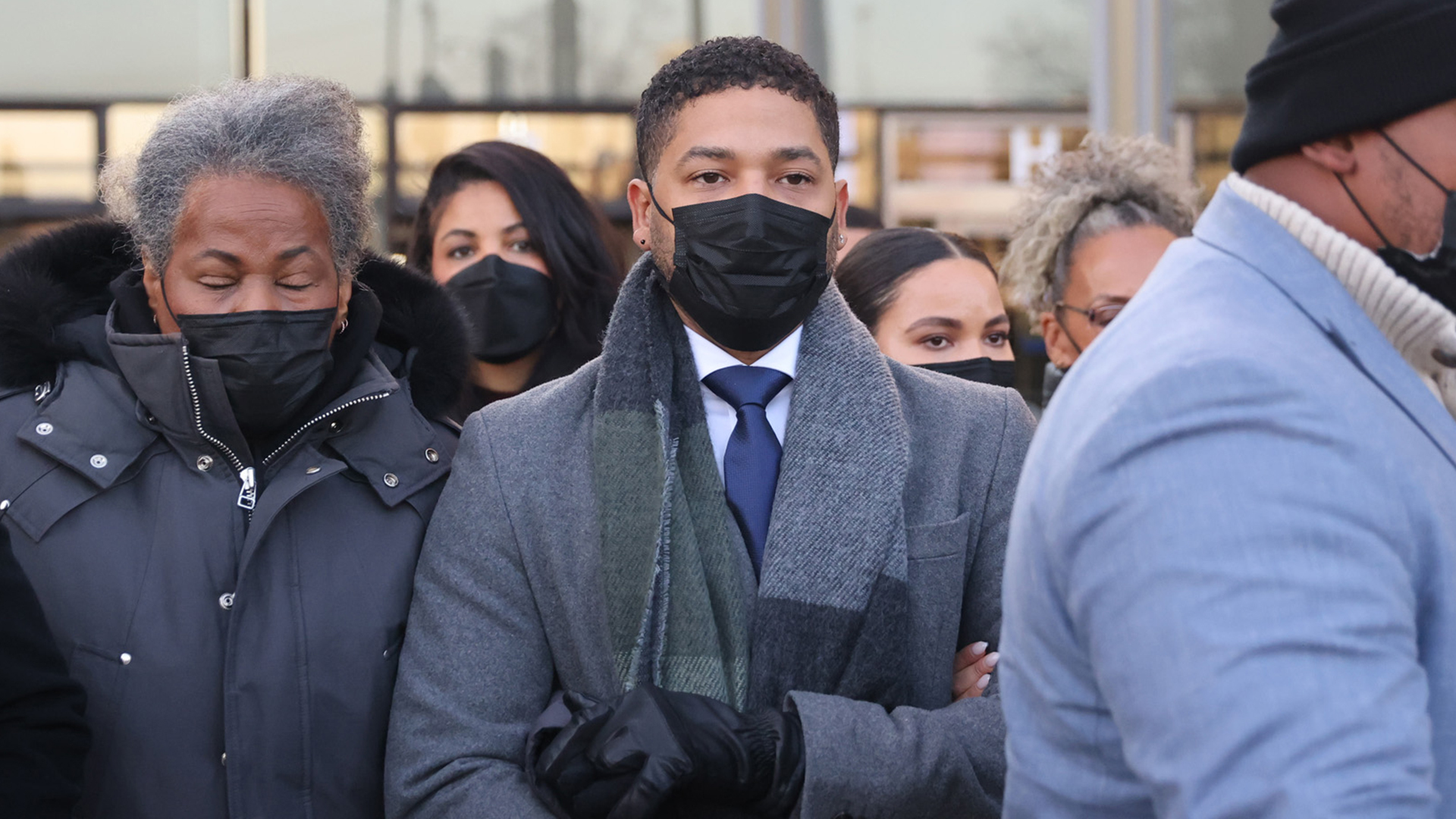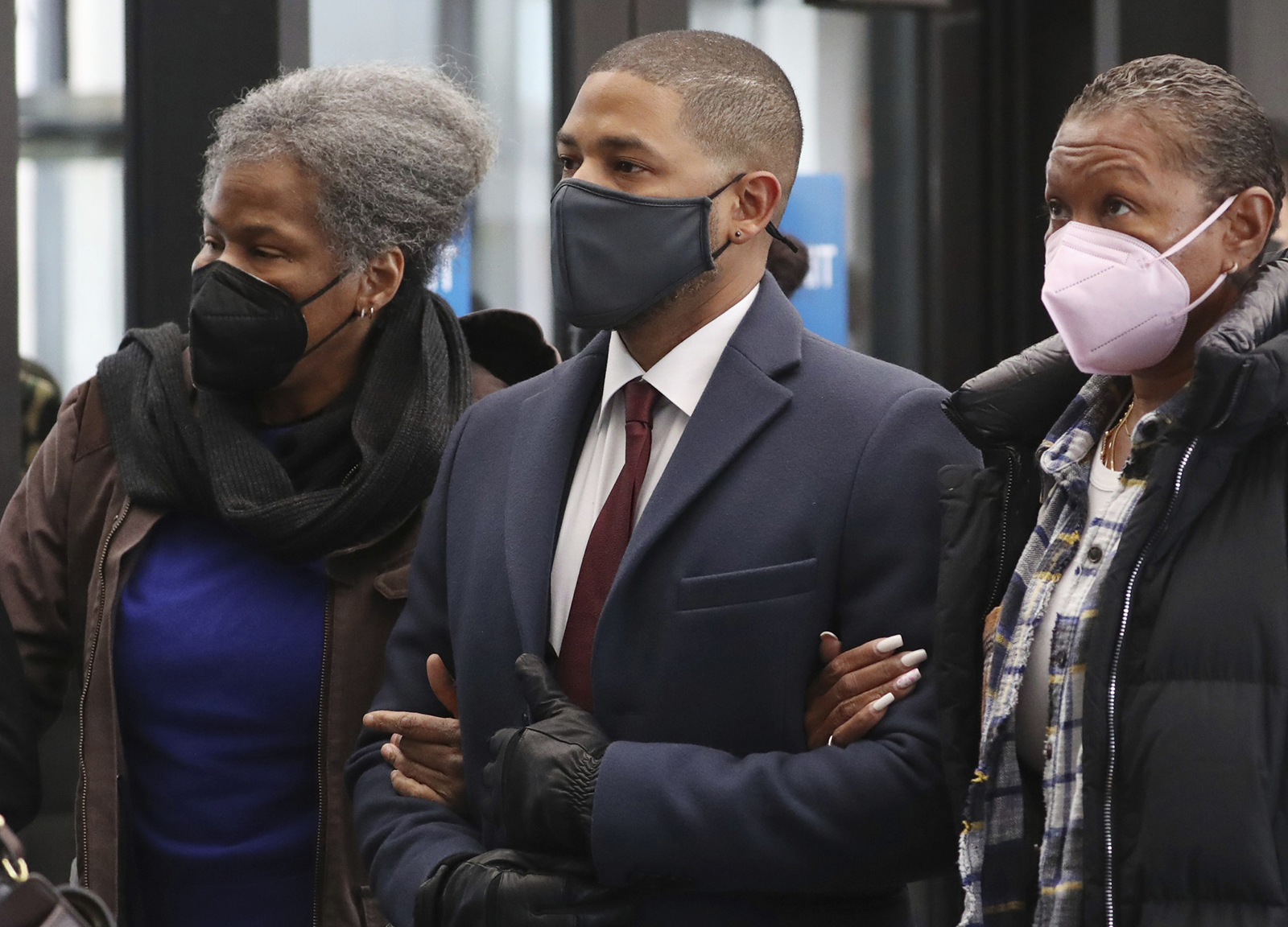Jussie Smollett will spend time in the Cook County Jail as part of his sentence in connection with a staged hate crime in Chicago, but he'll serve that time in protective custody, court records show.
A court document signed by Judge James B. Linn states that "Mr. Smollett shall serve the 150 day jail sentence in protective custody by Mr. Smollett's request and this court's recommendation."
Linn had sentenced Smollett to 150 days in Cook County Jail following his conviction for lying to police about being the victim of a hoax hate crime in 2019. Smollett was also sentenced to 30 months of felony probation, ordered to pay more than $120,000 in restitution to the city of Chicago and was fined $25,000.
He began his sentence immediately after learning his fate Thursday.
Thursday's sentencing could be the final chapter in a criminal case, subject to appeal, that made international headlines when Smollett, who is Black and gay, reported to police that two men wearing ski masks beat him, and hurled racial and homophobic slurs at him on a dark Chicago street and ran off.
In December, Smollett was convicted in a trial that included the testimony of two brothers who told jurors Smollett paid them to carry out the attack, gave them money for the ski masks and rope, instructed them to fashion the rope into a noose. Prosecutors said he told them what racist and homophobic slurs to shout, and to yell that Smollett was in “MAGA Country,” a reference to the campaign slogan of Donald Trump’s presidential campaign.
Smollett, who knew the men from his work on the television show “Empire” that filmed in Chicago, testified that he did not recognize them and did not know they were the men attacking him.
During his sentencing hearing, Smollett was allowed to make a statement, but chose not to on the advice of counsel, citing a potential appeal in the case.
But just after Linn read the sentence, Smollett addressed the court and once again denied wrongdoing in the case.
Feeling out of the loop? We'll catch you up on the Chicago news you need to know. Sign up for the weekly> Chicago Catch-Up newsletter.
“If I did this, then it means that I stuck my fist in the fears of Black Americans in this country for over 400 years and the fears of the LGBT community," Smollett said, standing up at the defense table as his lawyers and sheriff's deputies surrounded him. “Your Honor, I respect you and I respect the jury but I did not do this. And I am not suicidal. And if anything happens to me when I go in there, I did not do it to myself. And you must all know that.”
As deputies led Smollett from the courtroom, he repeatedly shouted that he was innocent, and that he was not suicidal.
Unlike the trial, Linn agreed to let photographers and a television camera inside court for the hearing — meaning the public for the first time got to see and hear Smollett speak in court.
In his ruling, Linn said the incident's "extreme premeditation" was an aggravating factor in the case. He also said that he believed Smollett orchestrated the attack to an exacting degree, rehearsing it extensively.
"You turned your life upside down," Linn said. "You destroyed your life as you know it. There is nothing I can do to you today that will come close to the damage you've done to your own life."
The judge said that he believed Smollett “craved attention” and that he faked the crime to “make yourself more famous.”
“You were throwing a national pity party for yourself,” the judge said.
The special prosecutor who brought the criminal case against Smollett that led to a guilty verdict against the actor asked a judge Thursday to include “an appropriate amount of prison time” when sentencing Smollett for his conviction.
Dan Webb said during the sentencing hearing that he would not ask for a specific amount of time, leaving that to Linn's discretion. He also asked that Smollett be ordered to pay $130,000 in restitution to the city of Chicago.
Witnesses for both the state and Smollett testified at his sentencing at the Cook County Courthouse. Chicago Police Supt. David Brown, who was called by the state, submitted a statement that was read aloud by Samuel Mendenhall, a member of the special prosecution team.
In the statement, Brown, who became superintendent in April 2020 and wasn’t with the city at the time of Smollett’s police report, said Smollett’s false report of a hate crime harmed “actual victims” of such crimes. Brown asked that the city be compensated for its costs, saying the cost of investigating his claim could have been spent elsewhere in the city.
“The city is a victim of Mr. Smollett’s crime,” Brown said.
Smollett’s grandmother, testifying for the defense, asked Linn not to include prison time in his sentence for Smollett.
“I ask you, judge, not to send him to prison,” Molly Smollett, 92, told the court. She later added, “If you do, send me along with him, OK?”
Jussie Smollett's brother, Joel Smollett, Jr., told the court that Jussie is “not a threat to the people of Illinois. In my humble opinion, he is completely innocent.”
Jussie Smollett’s attorneys also read aloud letters from other supporters, including an organizer with Black Lives Matter, the Rainbow PUSH Coalition and LaTanya and Samuel L. Jackson that asked Linn to consider the case’s effect on Smollett’s life and career and to avoid any confinement as part of his sentence.
Other supporters spoke about worries that Smollett would be at risk in prison, specifically mentioning his race, sexual orientation and his family’s Jewish heritage.
Before the sentencing began, Linn rejected a motion from the defense to overturn the jury's verdict on legal grounds. Judges rarely grant such motions.
“I do believe at the end of the day that Mr. Smollett received a fair trial,” Linn said.



